Mental health and cognitive energy are foundational to how we navigate daily life, make decisions, and maintain emotional equilibrium. In a world where stressors are ever-increasing and cognitive demands are escalating, it has become crucial to understand how targeted nutritional support can foster both mental resilience and clarity. Increasingly, research has highlighted the role of specific vitamins and nutrients in optimizing brain function, regulating mood, and improving concentration. This article delves into how the best vitamins for mental health and energy contribute to enhanced focus and sharper decision-making, all grounded in scientific evidence and medical accuracy.
You may also like: How to Choose the Best Brain Supplements for Adults: Science-Backed Ingredients That Support Focus, Memory, and Mental Clarity
While pharmaceutical interventions have their place, many individuals are seeking safer, long-term solutions. As a result, there’s growing interest in mental health supplements as part of a comprehensive wellness strategy. Unlike synthetic stimulants that may offer temporary boosts followed by crashes, quality supplements nourish the nervous system, stabilize mood fluctuations, and support neurotransmitter synthesis—laying the groundwork for sustainable cognitive performance.
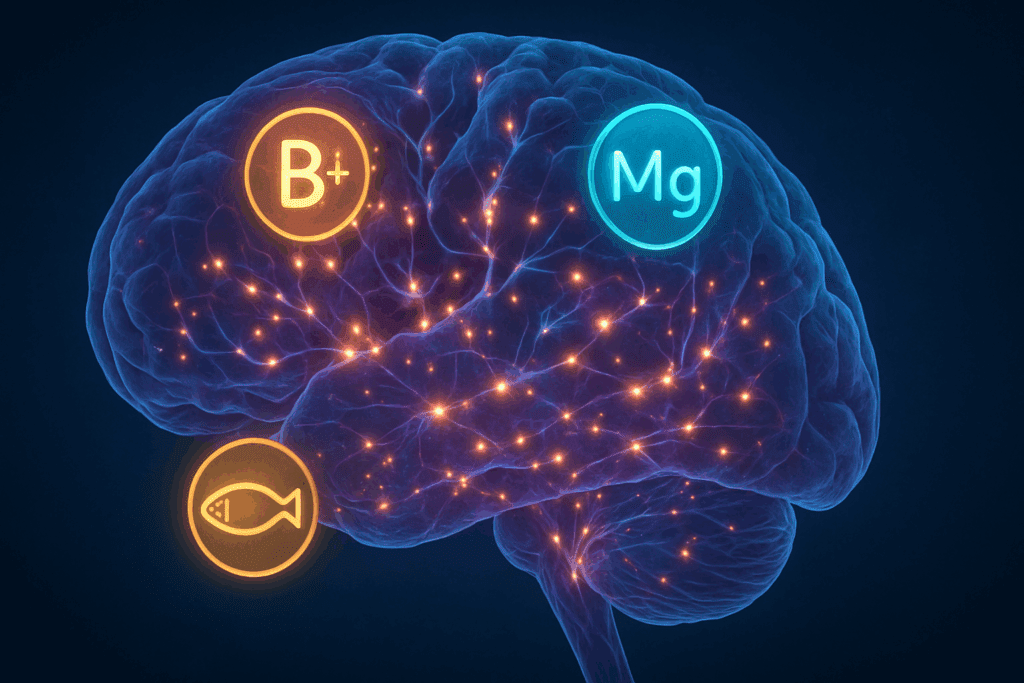
The Brain’s Nutritional Needs: Why Vitamins Matter for Mental Health
The brain, despite comprising only about 2% of our body weight, consumes over 20% of our daily energy. This energy doesn’t only fuel thinking—it sustains the biochemical reactions required for memory formation, emotional regulation, and decision processing. Micronutrients like B-complex vitamins, magnesium, zinc, and omega-3 fatty acids all serve as essential cofactors in these neural processes. When these nutrients are in short supply, cognitive and emotional symptoms often emerge—ranging from brain fog to low energy, anxiety, and impaired decision-making.
For those seeking the best vitamins for mental health and energy, it’s not simply about boosting stamina but rather ensuring a foundation for optimal neural communication. Many individuals overlook subclinical deficiencies that can subtly affect mental clarity and mood. Even marginal shortfalls in vitamin B12, folate, or vitamin D have been linked with increased risk of depression and cognitive decline, according to studies published in The Lancet Psychiatry and Nutritional Neuroscience.
Unlike medications that override the system, vitamins work in synergy with the body’s natural rhythms. They aid neurotransmitter production (like dopamine and serotonin), support mitochondrial energy generation in brain cells, and reduce neuroinflammation. The right combination, whether through diet or the best multivitamin for mental health, can have profound effects on focus and mood regulation.
Understanding the B-Vitamin Complex and Cognitive Energy
Among the most researched nutrients for mental vitality are the B vitamins. These water-soluble compounds act as enzymatic catalysts that convert food into fuel—especially important for the brain, where glucose is the primary energy source. Vitamin B12 (cobalamin) and folate (B9) are particularly crucial in regulating homocysteine levels, an amino acid that in excess has been linked with depression and neurodegenerative disorders.
Deficiencies in B-complex vitamins can manifest as mental fatigue, irritability, and poor concentration. For instance, low levels of vitamin B6 can impair serotonin production, contributing to mood swings and anxiety. Vitamin B1 (thiamine) is essential for acetylcholine synthesis, the neurotransmitter responsible for memory encoding. Moreover, biotin and niacin support healthy myelination, which ensures efficient signal transmission between neurons.
Those searching for the best vitamins for mental health and energy often benefit from a comprehensive B-complex supplement. Unlike isolated nutrients, B vitamins work best in harmony. Research in Nutrients journal reveals that supplementing with a full-spectrum B-complex not only improves subjective energy levels but also enhances executive function—making it a valuable tool for anyone looking to sharpen their decision-making under stress.
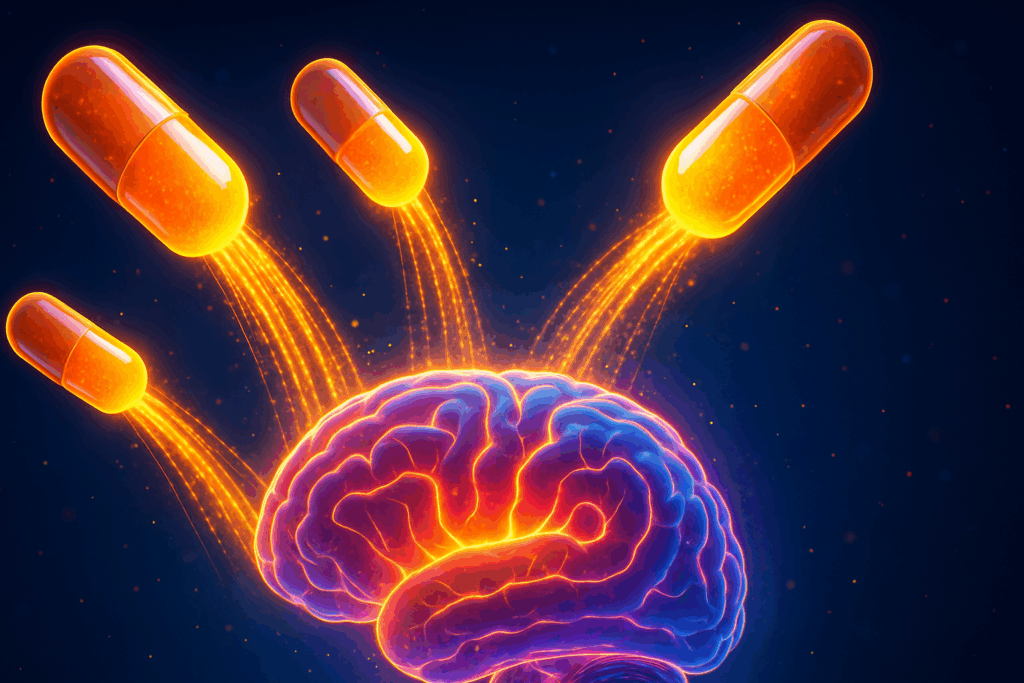
Vitamin D and Emotional Resilience
Vitamin D has long been associated with bone health, but recent findings underscore its profound influence on emotional regulation and cognitive performance. Often referred to as the “sunshine vitamin,” it interacts with receptors throughout the brain, including areas responsible for mood and planning. Deficiency has been consistently associated with higher rates of seasonal affective disorder, major depression, and generalized anxiety.
In northern climates or during winter months, vitamin D synthesis in the skin decreases, leading to suboptimal levels in the bloodstream. This deficiency can impair the hypothalamic-pituitary-adrenal (HPA) axis, which governs the body’s stress response. Supplementation with vitamin D, therefore, does more than support skeletal integrity—it modulates mood, reduces systemic inflammation, and potentially lowers cortisol dysregulation.
As one of the most essential mental health supplements, vitamin D stands out not only for its neurochemical influence but also for its safety and accessibility. When included as part of the best multivitamin for mental health, it contributes to improved alertness and decreased irritability—factors directly influencing decision-making performance, particularly under pressure.
Magnesium: The Unsung Hero of Calm Focus
Magnesium plays a pivotal role in over 300 enzymatic reactions, many of which are directly related to brain health. It supports the activity of NMDA receptors, which are involved in synaptic plasticity—a critical feature for learning and memory. In addition, magnesium acts as a natural calcium channel blocker, helping neurons maintain proper excitability and preventing overstimulation, which is a root cause of anxiety and poor concentration.
Low magnesium levels are alarmingly common due to modern dietary patterns rich in processed foods and caffeine. Symptoms of deficiency often include mental fatigue, muscle tension, sleep disturbances, and heightened stress sensitivity. For this reason, magnesium is often included in mental health supplements aimed at restoring nervous system balance.
Magnesium L-threonate, in particular, is a form that has demonstrated enhanced brain bioavailability in clinical studies. When incorporated into the best multivitamin for mental health, this mineral helps smooth out cognitive turbulence, making it easier to focus, think critically, and adapt under pressure.
Omega-3 Fatty Acids and Brain Structure Support
Although technically not a vitamin, omega-3 fatty acids—especially EPA and DHA—deserve mention for their vital contributions to cognitive clarity and mental health. These polyunsaturated fats are integral to the structure of neuronal membranes and influence the fluidity of brain cell communication. DHA concentrations are highest in the cerebral cortex, the area of the brain responsible for higher-order thinking, planning, and decision-making.
Emerging research has revealed that adequate omega-3 intake is associated with reduced symptoms of attention deficit, depression, and even cognitive aging. A meta-analysis in Translational Psychiatry found that individuals with depression often exhibit significantly lower levels of DHA and EPA in their bloodstreams.
Incorporating omega-3s into a daily supplement routine, especially in combination with the best vitamins for mental health and energy, yields synergistic effects. Not only do these fatty acids reduce inflammation that contributes to brain fog and mood instability, but they also improve synaptic signaling, helping the brain stay sharp and responsive.
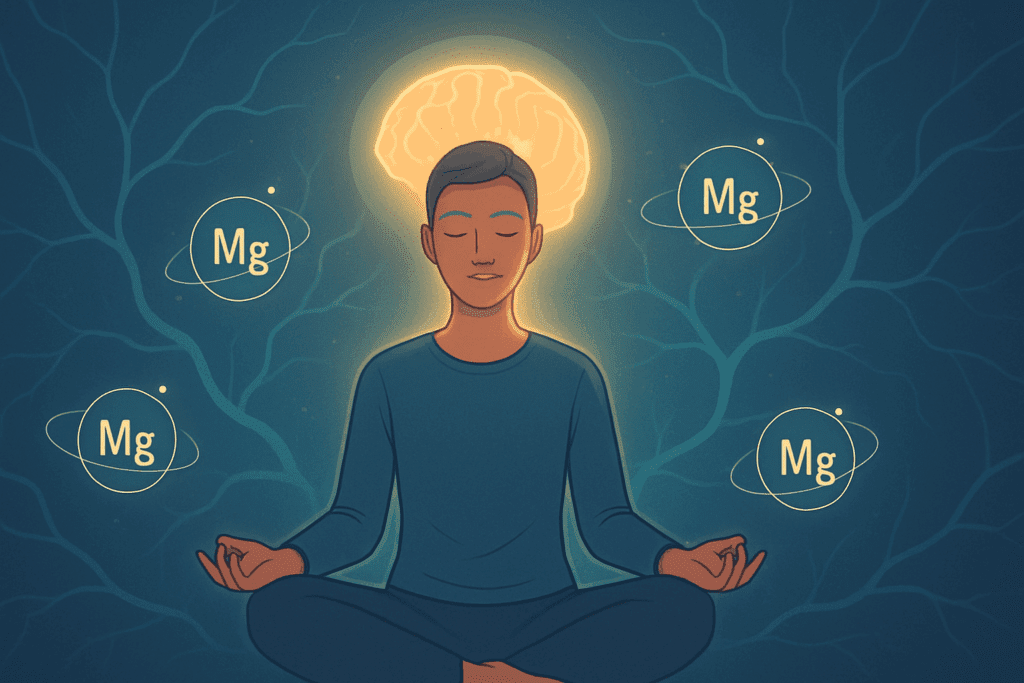
Zinc and Cognitive Adaptability
Zinc is another essential mineral that rarely receives the attention it deserves in mental wellness discussions. It plays a vital role in neurotransmitter modulation, brain plasticity, and synaptic function. The hippocampus—a region heavily involved in memory and learning—contains high concentrations of zinc. Imbalances in zinc have been implicated in both cognitive and emotional disorders.
Zinc supplementation has shown promise in enhancing neurogenesis and reducing anxiety symptoms, particularly in individuals under chronic stress. It also assists in modulating the gut-brain axis, which is increasingly recognized as a key pathway in mood regulation.
When included in mental health supplements, zinc supports both emotional stability and the kind of agile thinking needed in high-stakes decision environments. Ensuring its inclusion in the best multivitamin for mental health is a strategic move for those aiming to elevate their mental performance holistically.
Iron and Mitochondrial Energy in the Brain
Iron’s role in oxygen transport is well known, but its importance in brain energy metabolism is less commonly discussed. Iron supports the function of mitochondria in neurons, ensuring they can produce adequate ATP for the brain’s high energy demands. Inadequate iron, particularly in women of reproductive age, often results in anemia, a condition marked by fatigue, poor concentration, and apathy.
Cognitive symptoms of iron deficiency often precede physical signs, making it an insidious disruptor of mental clarity. Supplementation should be considered when blood tests reveal low ferritin or hemoglobin levels. However, because excess iron carries risks of oxidative stress, it’s crucial that iron-containing mental health supplements are taken under medical supervision or as part of a carefully formulated multivitamin.
Including a modest, bioavailable dose of iron in the best vitamins for mental health and energy ensures that oxygen delivery and energy production are not compromised—especially during periods of intense cognitive load or stress.
Choosing the Best Multivitamin for Mental Health
With a market saturated by hundreds of options, identifying the best multivitamin for mental health can be overwhelming. The ideal formulation is one that blends clinically effective doses of essential B vitamins, vitamin D, magnesium, zinc, and optional adaptogens or botanicals that support the central nervous system. Additionally, absorption is key—some synthetic forms of vitamins (like folic acid versus methylfolate) may not work as well for certain individuals due to genetic polymorphisms.
Another consideration is the presence of unnecessary additives. Artificial colors, binders, and fillers can counteract the benefits of otherwise useful ingredients. A trustworthy multivitamin should prioritize bioavailability and transparency in sourcing, ideally backed by third-party testing for potency and purity.
Rather than treating symptoms in isolation, the best multivitamin for mental health provides a systemic approach to mood regulation, cognitive clarity, and energy optimization. As part of a daily routine, such a supplement can serve as an anchor—supporting the mental resilience needed to thrive in decision-heavy environments, whether academic, professional, or personal.
The Role of Lifestyle in Vitamin Efficacy
It’s important to recognize that even the most sophisticated mental health supplements are not magic bullets. Their effectiveness is significantly amplified—or hindered—by lifestyle factors such as sleep quality, physical activity, and dietary choices. Regular exercise improves blood flow to the brain and promotes neurogenesis, while high-quality sleep consolidates memory and restores neurotransmitter balance.
Nutrition also plays a foundational role. A Mediterranean-style diet rich in leafy greens, whole grains, lean proteins, and healthy fats naturally provides many of the best vitamins for mental health and energy. Supplements should be seen as adjuncts—tools to bridge nutritional gaps, not replace whole food sources.
Moreover, stress management techniques like meditation, time in nature, and digital detoxing can help recalibrate the nervous system, making it more receptive to the beneficial effects of micronutrient therapy. Thus, a truly integrative approach to mental wellness doesn’t stop at supplementation but embraces a holistic view of mind-body health.

Frequently Asked Questions (FAQ): Advanced Insights on Mental Health Supplements and Cognitive Nutrition
1. What are some overlooked factors that influence how well mental health supplements work?
While dosage and ingredients are important, factors like gut health, genetic polymorphisms (such as MTHFR mutations), and even circadian rhythm alignment can significantly affect how mental health supplements are absorbed and utilized by the body. For example, individuals with poor gut microbiota diversity may struggle to synthesize or absorb key nutrients like B vitamins and magnesium. Taking supplements at the wrong time—such as energizing adaptogens late at night—can disrupt sleep and cognitive clarity. For personalized results, many integrative practitioners now recommend microbiome testing and nutrigenomic analysis. These approaches help tailor supplementation regimens, particularly when targeting the best vitamins for mental health and energy.
2. Can the best multivitamin for mental health also support long-term neuroprotection?
Yes, certain multivitamins are formulated not just for immediate mood or focus boosts but for long-term brain health. These often include neuroprotective nutrients such as phosphatidylserine, choline, B-complex vitamins, and antioxidants like alpha-lipoic acid or astaxanthin. Longitudinal studies suggest that consistent use of such formulas may reduce the risk of age-related cognitive decline, especially when combined with physical activity and cognitive stimulation. The best multivitamin for mental health should go beyond just meeting the Recommended Daily Intake (RDI); it should support mitochondrial resilience, neurotransmitter balance, and synaptic plasticity. This broader scope of support is increasingly seen as vital in preventative mental wellness strategies.
3. How does nutrient timing influence the effectiveness of mental health supplements?
Nutrient timing plays a crucial role in how well supplements support mental clarity and energy. For instance, taking the best vitamins for mental health and energy—like B12, tyrosine, or Rhodiola—first thing in the morning aligns with your body’s natural cortisol awakening response. Conversely, taking calming supplements like magnesium glycinate or L-theanine closer to bedtime enhances their relaxing effects without blunting daytime alertness. Some mental health supplements, such as SAMe or 5-HTP, may interfere with sleep if taken too late. Aligning supplement timing with circadian biology is a nuanced strategy that enhances both short-term performance and long-term mental health outcomes.
4. Are there specific mental health supplements that work better for people under chronic stress?
Chronic stress depletes key nutrients such as magnesium, vitamin C, and B-complex vitamins, which are essential for mood regulation and stress resilience. Mental health supplements targeting the hypothalamic-pituitary-adrenal (HPA) axis—like ashwagandha, Rhodiola, or even adaptogenic mushrooms such as Reishi—are particularly useful in this context. These compounds modulate cortisol levels, reduce oxidative stress, and restore adrenal function. The best multivitamin for mental health in high-stress individuals should also include methylated B12 and folate for better mood and energy metabolism. Functional medicine experts often use stress biomarkers like salivary cortisol to personalize supplement regimens for better outcomes.
5. How does the bioavailability of a supplement affect its ability to support mental health?
Bioavailability refers to how much of a nutrient your body actually absorbs and uses. Many over-the-counter vitamins—especially cheaper ones—use forms that are poorly absorbed, such as cyanocobalamin instead of methylcobalamin for B12. To get the most out of mental health supplements, look for bioavailable forms like magnesium L-threonate, P-5-P for B6, or liposomal delivery systems. The best vitamins for mental health and energy often use advanced technologies such as sustained-release capsules or nanoemulsified forms to improve cellular uptake. Choosing a high-quality, bioavailable supplement can make the difference between noticeable results and wasted money.
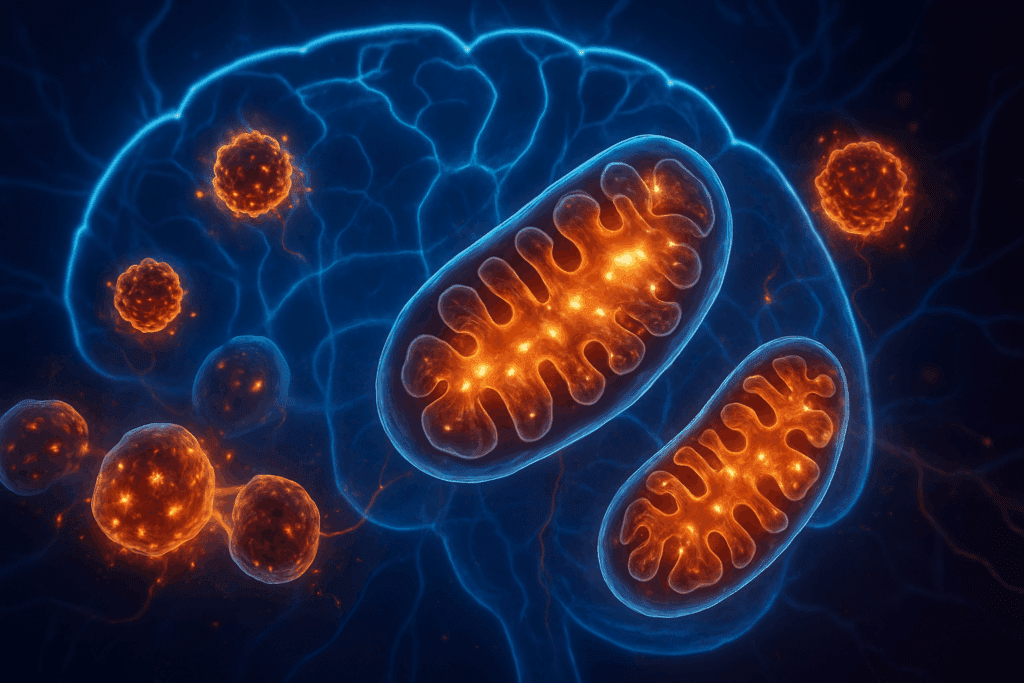
6. Can dietary gaps still exist if someone takes a high-quality multivitamin?
Surprisingly, yes. Even when taking the best multivitamin for mental health, specific lifestyle habits or medical conditions may increase the demand for certain nutrients. For instance, smokers may require higher levels of vitamin C, while people with insulin resistance often benefit from extra chromium and alpha-lipoic acid. Moreover, synthetic forms of nutrients may not function identically to their naturally occurring counterparts in whole foods. This is why mental health supplements should be seen as supportive tools rather than replacements for a nutrient-dense diet. A food-first strategy, supplemented thoughtfully, yields the best long-term results for cognitive vitality.
7. How do mental health supplements impact decision-making and executive function?
Beyond mood stabilization, many mental health supplements influence executive functions like planning, working memory, and impulse control. Ingredients such as Bacopa monnieri, Lion’s Mane, and citicoline support synaptic signaling and neuronal repair, which are critical for high-level cognition. These effects are particularly beneficial for individuals facing cognitive fatigue from demanding environments. The best vitamins for mental health and energy may help reduce brain fog, enabling quicker, more confident decision-making. Functional MRI studies show increased prefrontal cortex activation in subjects taking these nootropic-style supplements over time.
8. What role does inflammation play in choosing the best mental health supplements?
Chronic inflammation is increasingly recognized as a contributor to depression, brain fog, and anxiety. Supplements that address neuroinflammation—such as omega-3s, curcumin, and N-acetylcysteine (NAC)—can support better emotional and cognitive regulation. Individuals with elevated C-reactive protein (CRP) levels often benefit more from these anti-inflammatory agents than from standard mood-targeting nutrients alone. The best multivitamin for mental health may also include zinc and selenium, which help modulate immune responses linked to brain function. Integrating anti-inflammatory strategies into mental health supplementation is a cutting-edge approach to holistic treatment.
9. Are there any mental health supplements that can enhance the effects of therapy or counseling?
Yes. Several studies have shown that supplements like omega-3 fatty acids, saffron, and inositol can enhance the effects of psychotherapy and cognitive-behavioral interventions. These nutrients support neurotransmitter balance and neuroplasticity, potentially making the brain more receptive to behavioral change. When combined with therapy, the best vitamins for mental health and energy can reduce emotional volatility and improve focus, making sessions more productive. This integrative approach is gaining popularity among holistic psychiatrists and therapists seeking to improve client outcomes. Always consult a licensed professional when combining supplements with therapeutic interventions.
10. What are the emerging trends in mental health supplements for 2025 and beyond?
Personalized supplementation based on genetic and metabolic profiling is one of the most promising trends. AI-driven supplement platforms are now using data from wearable devices and biomarker tests to tailor daily regimens for cognitive performance. Novel ingredients—like saffron extract, GABA analogs, and marine phytoplankton—are also gaining attention for their unique mechanisms of action. The future of the best multivitamin for mental health may include adaptogens, nootropics, and even prebiotics to support the gut-brain axis. As mental health care becomes more individualized, expect supplement protocols to become smarter, safer, and significantly more effective.
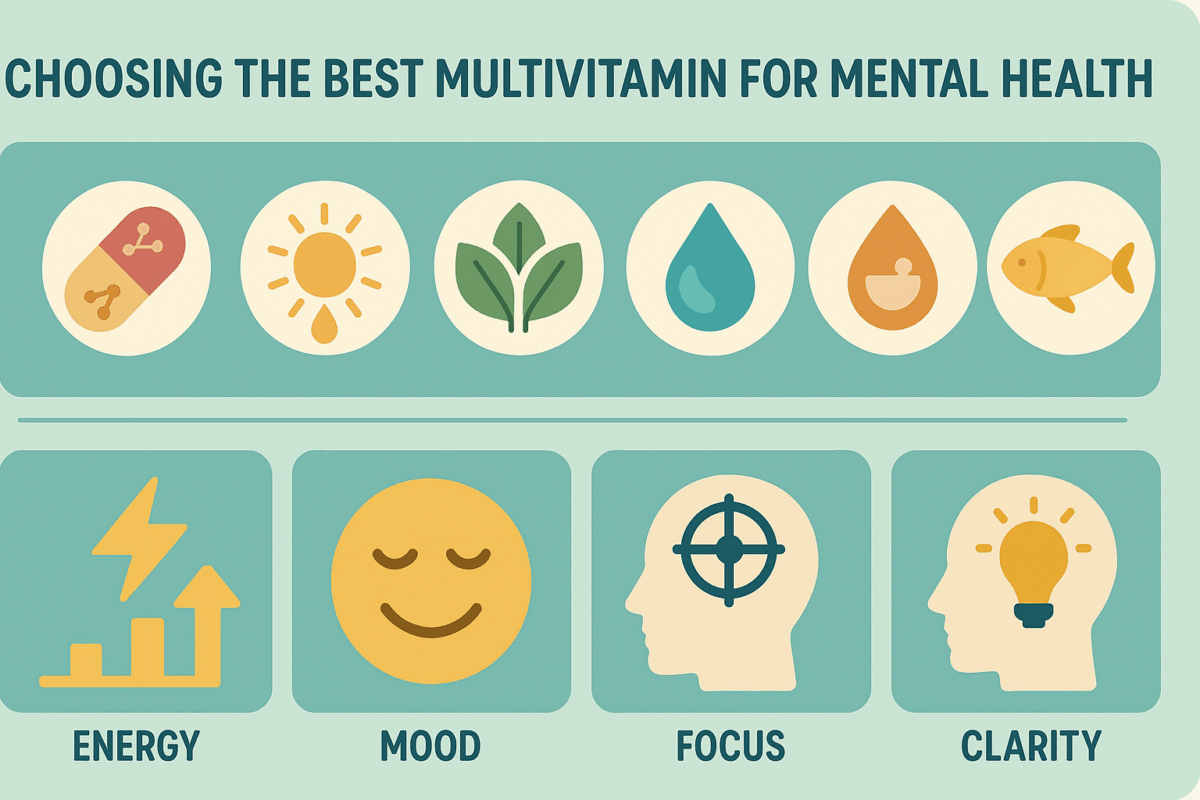
Final Thoughts: Supporting Focus and Decision-Making with the Best Vitamins for Mental Health and Energy
Navigating a fast-paced, mentally demanding world requires more than just willpower—it demands physiological support that starts at the cellular level. The best vitamins for mental health and energy serve as essential co-pilots in this journey, fortifying brain function, enhancing emotional resilience, and sharpening our decision-making abilities. Far from being ancillary, these nutrients lay the foundation for a well-regulated, high-performing mind.
By integrating scientifically validated mental health supplements into a balanced lifestyle, individuals can unlock greater cognitive clarity and emotional stability. Whether you’re managing a high-stakes workload, pursuing academic excellence, or simply striving for better daily functioning, a targeted vitamin strategy can offer substantial, evidence-backed benefits. The best multivitamin for mental health doesn’t just fill nutritional gaps—it empowers you to think, decide, and thrive with confidence.
As with any health intervention, consulting with a qualified healthcare provider ensures that your supplement strategy aligns with your individual biology and goals. With the right tools and informed choices, mental well-being and cognitive strength are not abstract ideals—they are attainable realities, rooted in science and within reach.
Further Reading:
5 best supplements to support your mental health, according to a psychiatrist


